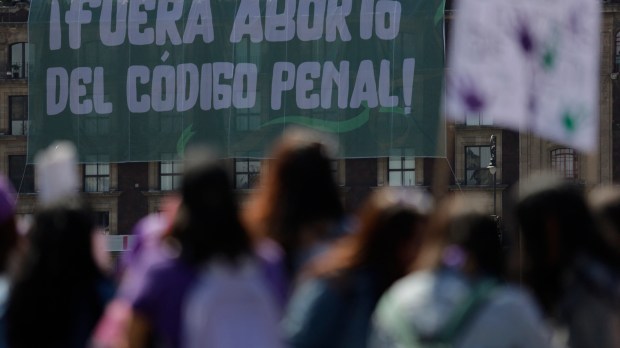A Mexican court ruling in early September that supposedly decriminalizes abortion might not be what it’s been made out to be, a pro-life population think tank is explaining.
Associated Press and other media reported September 6 that Mexico’s Supreme Court threw out all federal criminal penalties for abortion. The ruling, according to AP, says that national laws prohibiting abortion are unconstitutional and violate women’s rights.
“The high court ordered that abortion be removed from the federal penal code,” said the wire service. “The ruling will require the federal public health service and all federal health institutions to offer abortion to anyone who requests it.”
But Carlos Beltramo, Director of the Population Research Institute’s European Office, pointed out in a recent op-ed piece that the Supreme Court issued a temporary ruling called, in Spanish, an amparo.
“The case in question was filed by GIRE, Mexico’s leading abortion advocacy group, and asks the Supreme Court to declare that the provision in the Federal Penal Code that punishes those who engage in induced abortion to be unconstitutional,” Beltramo wrote. “While their case is under review, GIRE — supposedly on behalf of Mexican women, requested the Court to issue the amparo.”
But, he said, the court violated its own rule that an amparo be issued only in response to a request from an injured party which claims that his or her rights have been violated.
“One cannot make a request for an amparo on behalf of others, yet this is precisely what GIRE did,” filing a request for an amparo on behalf of “Mexican women.”
No standing
GIRE is an organization, not an individual, and therefore cannot perform an abortion, Beltramo argued. Nor is it even in the business of performing abortions. So, it has not been, and cannot be harmed by laws criminalizing abortion.
Beltramo believes that the story has been misreported as part of a campaign to discourage Mexico’s pro-life movement and to lead people to believe that the fight for the defense of innocent human life is lost.
But, he points out, the momentum is decidedly in the opposite direction. Since the Supreme Court in 2007 returned the decision on abortion to the state level, much as the US Supreme Court did last year in striking down Roe v. Wade, 23 of Mexico’s 32 states have passed laws protecting life from conception.
Aleteia reached out to GIRE for comment but hasn’t received a response.
Meanwhile, Pilar Vázquez Calva, lawyer and spokesperson for the pro-life organization Mujeres Libres y Sobernas (Free and Sovereign Women Collective), agreed that the Court decision is “not equivalent to legalizing or decriminalizing abortion in all of Mexico.” That is still up to each state to decide.
“The federal criminal code only applies for embassies, boats registered to Mexico, and other very limited examples,” said Vázquez Calva. “The Court did not even ask the federal congress to change the articles in the federal criminal code that govern abortion. There was a lot of confusion and misinformation on this case from both sides.”
But the high court fabricated rights in opposition to the Constitution and international treaties, she said.
Vázquez Calva added that the Free and Sovereign Women Collective has “repeatedly denounced” the Supreme Court’s use of non-legal, non-scientific terms and concepts such as “pregnant person” or “menstruating body,” promoting the “erasure” of women.
For his part, Beltramo said that even if an amparo is granted to GIRE, the ruling cannot be applied to other people. “The amparo only applies to the person filing the appeal. It does not have the slightest power to force hospitals to perform abortions or to sanction doctors who do not want to do so.”
He admitted that the ruling is a step in the direction of decriminalization of abortion in Mexico, “but the truth is that this needs Congress to pass a law.”




